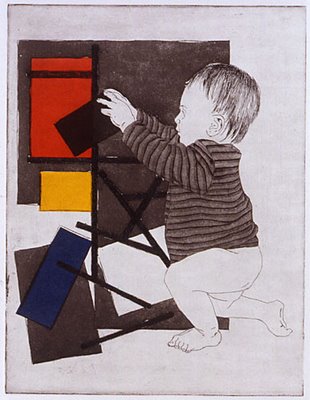Recently, I was invited by a "sex-positive feminist collective" called
The PeepShow Collective to submit some artwork for an exhibition they are mounting (pun intended) in a Detroit art gallery. Previous to this invite, I was vaguely familiar with the term "sex-positive feminist" and understood only that it's philosophy opposed the anti-pornography feminism of such 80's luminaries as
Catharine MacKinnon and
Andrea Dworkin. However, I was curious to learn a more specific definition, and delved a little further.
Here's the definition as given by Wikipedia:
"Sex-positive feminism, sometimes known as pro-sex feminism, sex-radical feminism, or sexually liberal feminism, is a movement that was formed in the early 1980s. Some became involved in the sex-positive feminist movement in response to efforts by anti-pornography feminists, such as Catharine MacKinnon, Andrea Dworkin and Dorchen Leidholdt, to put pornography at the center of a feminist explanation of women's oppression (McElroy, 1995). Other, less academic sex-positive feminists became involved not in opposition to other feminists, but in direct response to what they saw as patriarchal control of sexuality. Authors who have advocated sex-positive feminism include Susie Bright, Betty Dodson, and Pat Califia.
Sex-positive feminism centers around the idea that sexual freedom is an essential component of women's freedom. As such, sex-positive feminists oppose legal or social efforts to control sexual activities between consenting adults, whether these efforts are initiated by the government, other feminists, opponents of feminism, or any other institution. They embrace sexual minority groups, endorsing the value of coalition-building with members of groups targeted by sex-negativity. Sex-positive feminism is connected with the sex-positive movement.
Gayle Rubin (Rubin, 1984) summarizes the conflict over sex within feminism:
...There have been two strains of feminist thought on the subject. One tendency has criticized the restrictions on women's sexual behavior and denounced the high costs imposed on women for being sexually active. This tradition of feminist sexual thought has called for a sexual liberation that would work for women as well as for men, The second tendency has considered sexual liberalization to be inherently a mere extension of male privilege. This tradition resonates with conservative, anti-sexual discourse.
The cause of sex-positive feminism brings together anti-censorship activists, queer activists, feminist scholars, sex radicals, producers of pornography and erotica, among others (though not all members of these groups are necessarily both feminists and sex-positive people). Sex-positive feminists reject the vilification of male sexuality that they attribute to many radical feminists, and instead embrace the entire range of human sexuality. They argue that the patriarchy limits sexual expression and are in favor of giving people of all genders more sexual opportunities, rather than restricting sexual expression in the form of pornography (Queen, 1996). Sex-positive feminists generally reject sexual essentialism, defined by (Rubin, 1984) as "the idea that sex is a natural force that exists prior to social life and shapes institutions". Rather, they see sexual orientation and gender as social constructs that are heavily influenced by society.
Sex-Radical feminists in particular come to a sex-positive stance from a deep distrust in the patriachy's ability to secure women's best interest in sexually limiting laws."
Here's the link if you're desperate to learn more:
http://en.wikipedia.org/wiki/Sex-positive_feminism
 Dolls for adults. Everywhere I look these days I find these arty, quirky dolls which are clearly created for an adult market. (No, not that kind of adult market, you perv). A couple of weeks ago, while walking in the Queen & Spadina area, I spotted a store window chock-a-block with such curiosities as the Living Dead Dolls and even a Tony Montana doll (Al Pacino's character from Scarface).
Dolls for adults. Everywhere I look these days I find these arty, quirky dolls which are clearly created for an adult market. (No, not that kind of adult market, you perv). A couple of weeks ago, while walking in the Queen & Spadina area, I spotted a store window chock-a-block with such curiosities as the Living Dead Dolls and even a Tony Montana doll (Al Pacino's character from Scarface).









